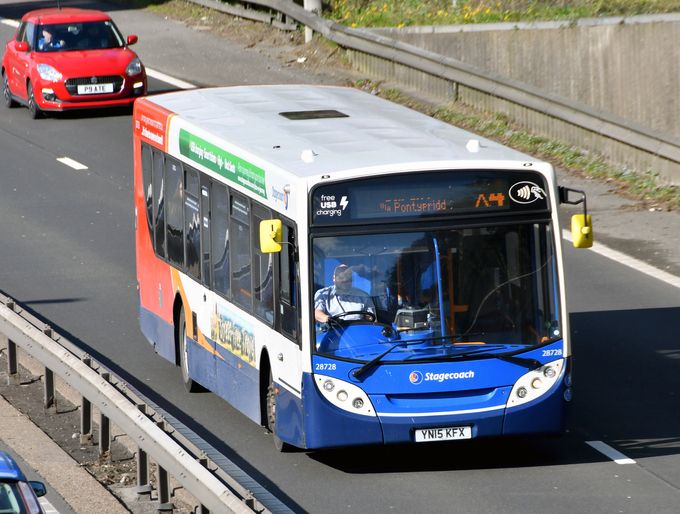Stagecoach bus drivers in South Wales win £1 per hour pay rise
Mark Murphy is a bus driver and GMB Branch Secretary for Stagecoach’s Merthyr Tydfil depot in South Wales. He says drivers are fed up.
“What we have seen over the years is cost-cutting and downgrading of terms and conditions. Our unpaid breaks have increased, and we don’t really have enhanced overtime/unsocial hour rates (except on Sundays). Every year we have to make concessions on pay deals. New starters face 2nd and 3rd generation contracts. We lose drivers on a frequent basis, and something needs to be done to attract new staff and, more importantly, to retain existing experienced…drivers”.
A demand for better for Wales’ bus drivers
Drivers in Wales earn some of the lowest wages in the sector across the UK. In South Wales, drivers can earn as little as £9.50 an hour compared to £12.50 in the southwest of England. So, in 2021, GMB and Unite in Wales started a joint campaign to improve bus drivers’ conditions. The unions demanded uniform terms and conditions across all bus depots.
During the Covid-19 pandemic, the bus drivers were hailed as essential workers. But in April 2021 Stagecoach drivers learned that their pay would be frozen for the second year running. This happened after pay talks broke down between GMB, Unite, and Stagecoach.
To fight back, GMB and Unite sent a letter to Stagecoach demanding joint bargaining and pay increases across depots in South Wales. But the director of Stagecoach declined their demands. Instead, he insisted on negotiating terms and conditions individually with each depot.
Mark Murphy explains: “The company approached our depot and the Cwmbran depot separately - breaking our preferred method of collective bargaining. We told them that Porth depot just a few miles down the road, with the same union, was paying drivers around 60p more per hour more. Originally, we...wanted parity pay, but the company said that they couldn’t afford it.”
In the summer of 2021, GMB and Unite balloted their members for coordinated strike action for equal pay rates across six valley depots.
Planning strike tactics for maximum impact
At the Merthyr Tydfil Stagecoach depot, union density is 99%. Drivers at this depot voted overwhelmingly in support of industrial action. Stagecoach is contracted by the local council to provide school transport. So GMB members planned their strike action to coincide with the first week of the school term. This put pressure on Stagecoach.
Gareth Morgans, GMB organiser for South Wales explains. “We targeted the first week of September to take our first day of action. This turned out well because we had the company backed into a corner.”
The impacts of Brexit and poor working conditions across the sector mean that there is an estimated shortage of 4,000 bus drivers in the UK. The union knew there was little possibility of Stagecoach replacing the striking drivers.
Unions winning for bus drivers in Merthyr Tydfil
The threat of strike action meant that Stagecoach met the workers’ demand for a 10% pay rise before the strike even began. In September 2021 Merthyr Tydfil depot drivers pay was increased from £10 to £11 per hour.

The victory at Merthyr Tydfil was the first of several wins for workers across Stagecoach depots in Wales. A month later, Unite members also voted in favour of strike action. Unite members at Cwmbran, Brynmawr and Blackwood depots went on continuous strike, disrupting 50 routes. Within a month, drivers won a pay rise of £1 per hour.
Unionised workers are, on average, paid more than non-unionised workers. So, if you’re not a member yet, join a union today
Unions working together with Welsh government
As well as undertaking joint action to increase pay, Unite and GMB continue to work together to represent bus drivers across Wales. GMB and Unite representatives take part in the Welsh government’s monthly Transport for Wales forum.
They use the forum to push for the input of the union and bus drivers in government decision making around public transport. Mark Murphy says “The forum is useful for both Transport for Wales and us. But there needs to be more direct union involvement with the Welsh government.”
“My members no longer want privatisation. We as members and unions would prefer full nationalisation of the industry…to wear a Transport for Wales (TFW) uniform, drive TFW liveried buses…However we understand that the Welsh Government has plans for bus franchising. This is where the public-private partnership is the preferred option. This is not my members’ ideal option, but it does change the format of running bus services to the needs of the public instead of for commercial profit.”
Ambitions for the future of bus drivers in South Wales
Mark Murphy sees the pay victory and joint union campaigning as the first of many changes to the bus sector.
“We need to change terms and conditions because it’s a great and fulfilling job, especially if you like both driving and interacting with people. And we need to entice everyone….we need to bring more women into the industry. That is one thing that we as a union can do more of. In our depot only 7% of drivers are a woman, that’s a low figure. But together we can make it a career for everyone.”
